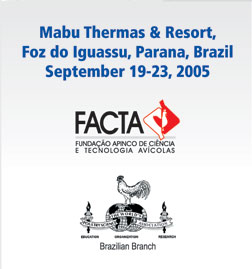Contributed Papers: Oral Presentations
Chemotherapy |
Treatment of
Mice with the anticoccidial drug Toltrazuril does
not interfere with the development of a specific cellular
intestinal immune response to Eimeria falciformis
Pogonka T.1, Steinfelder S.1, Greif
G.2 and Lucius R.1
thomas.pogonka@rz.hu-berlin.de
1Chair of Molecular Parasitology, Humboldt
University Berlin, Germany
2Bayer HealthCare, Animal Health, 51368 Leverkusen,
Germany
Therapeutic
in-water treatment with anticoccidial compounds is
an important tool to minimize the damage caused by
coccidiosis in animal husbandry. Toltrazuril (Baycox),
a symmetrical triazinetrione, terminates ongoing infections
with Eimeria parasites in avian and mammalian species.
Immunity against Eimerian infections is highly specific
and depends on cell-mediated immunity. In order to
investigate the influence of toltrazuril treatment
on the development of intestinal cellular immune response,
cells of mesenteric lymph nodes, Peyer´s patches,
intraepithelial lymphocytes and spleen from infected
and treated BALB/c mice were investigated. Infection
of BALB/c mice with 1000 oocysts of Eimeria falciformis
led to protection against a repeat challenge infection.
Treatment with the anticoccidial toltrazuril terminated
primary infections, but did not interfere with the
establishment of protective immunity against challenge
infections. Mesenteric lymph node cells of non-treated
as well as treated BALB/c mice showed a similar rate
of proliferation upon stimulation with parasite antigens.
In contrast, neither cells of the Peyer´s patches,
intraepithelial lymphocytes nor spleen cells responded
to stimulation with parasite antigens at this time
point. Cells from all compartments of all investigated
groups proliferated and released the cytokines IFN-gamma
and IL-4 in response to the mitogen concanavalin A.
The number of cells releasing IFN-gamma or IL-4 were
not dependent on the status of infection or previous
treatment with toltrazuril. The IgG response against
total sporozoite antigens in the sera of individual
mice showed that a systemic humoral response developed
in both infected groups, although the specific IgG
antibody concentration was higher for non-treated
mice. In conclusion, toltrazuril does not impair the
parasite-specific intestinal cellular intestinal immune
response and allows equal protection against challenge
infection as in non-treated animals.
